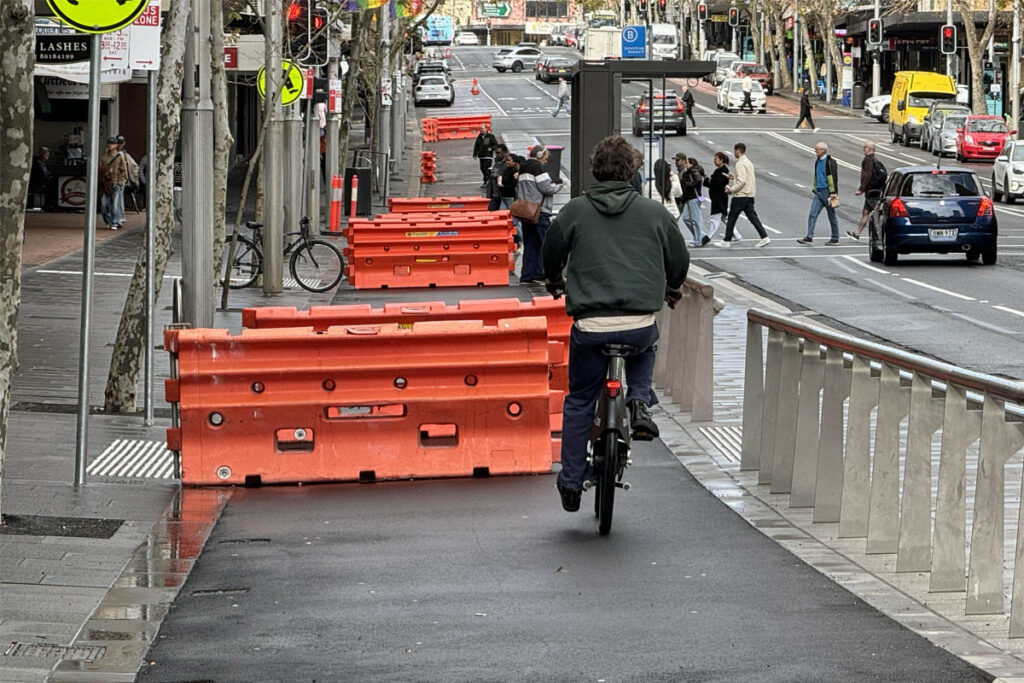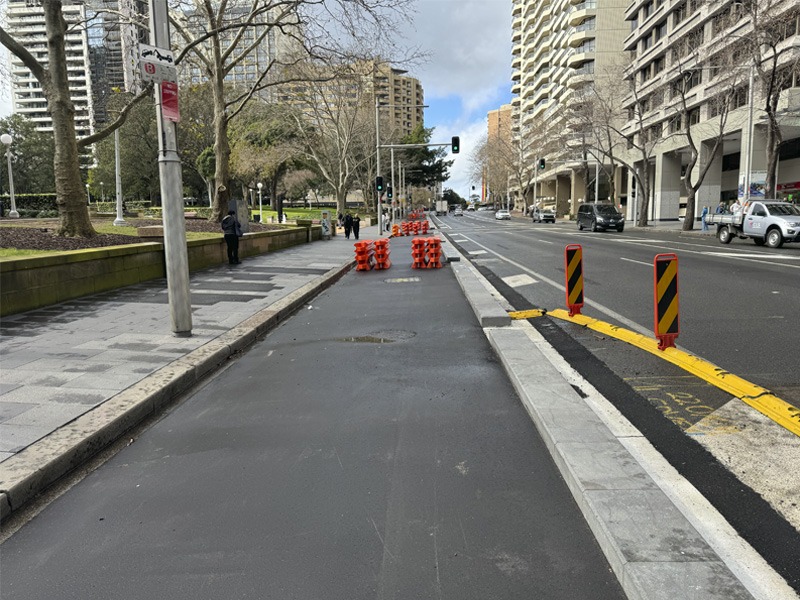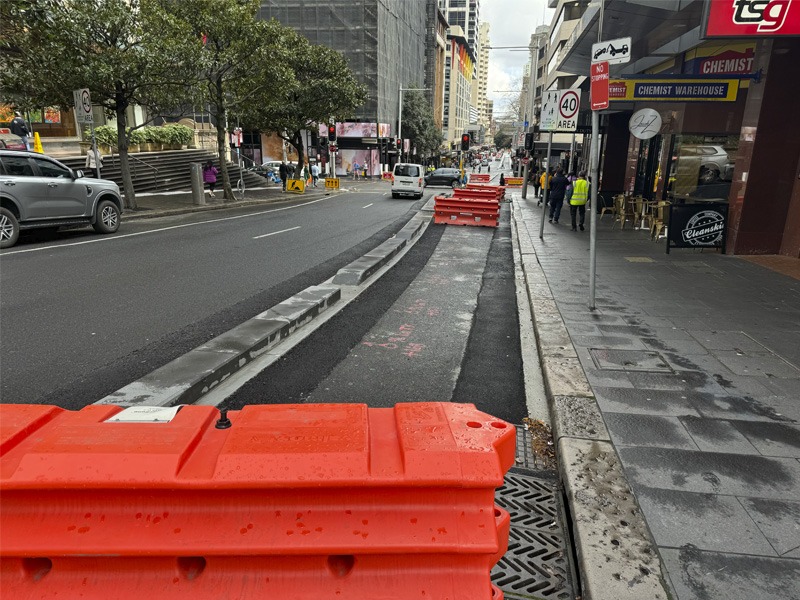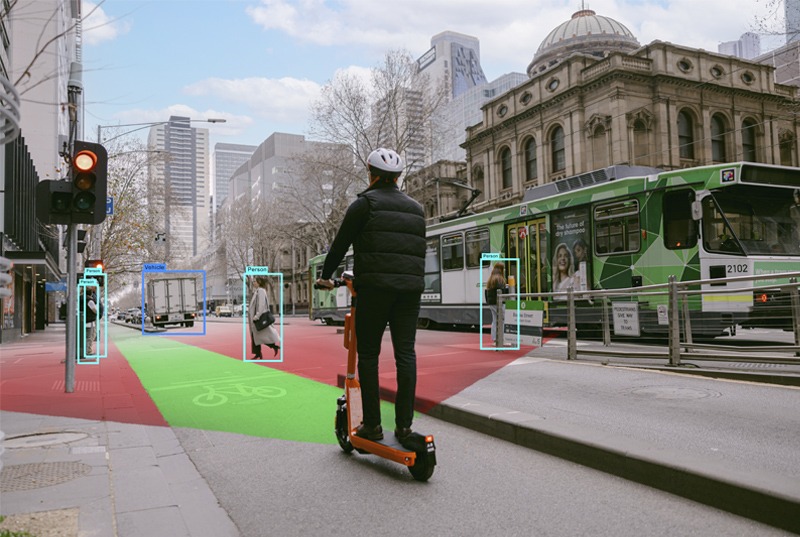Infrastructure Briefs – From Sydney to Frankfurt and More

Missing Link Construction is Almost Complete
As we’ve previously reported several times including here and here, the City of Sydney has been gradually overcoming all obstacles to build a major new protected cycleway along Oxford and Liverpool streets.
This is a key missing link between the eastern suburbs of Sydney and the CBD and will almost certainly become one of Australia’s most heavily used cycleways when it is opened.
Recently I visited the site and took the photos that accompany this article.


A City of Sydney spokesperson said, “We’re building a new 2-way separated cycleway along Liverpool and Oxford streets to support people riding on what is already one of the city’s busiest bike routes. Almost 3,000 people ride along here daily and we expect that number to double after construction is complete.
“The Oxford Street West project will see a safe, separated cycleway built between Castlereagh Street in the city and Taylor Square. The state government’s Oxford Street East project will extend the route from Taylor Square to Centennial Park.
“Our works are being staged to minimise disruption. Initial works began on western sections of the project and we’ll soon begin construction between Riley street and Taylor Square. We expect the project to be completed in early 2025, weather and other conditions permitting.”

Scooter Share Finally Made Permanently Legal in Victoria
After multiple extensions of a trial period in limited areas, shared e-scooters will be permanently legal throughout Victoria from October 2024. Since the e-scooter trial began in 2022, about 9 million trips have been taken across Victoria according to the government making it one of the most popular schemes in the world.
The announcement, made on 19th July, came with large increases to a raft of fines.
The fine for not wearing a helmet will increase from $247 to $395, speeding will see riders now cop a $346 fine, and underage riders will be fined $296, the same amount if riders are caught on a footpath.
“These are hefty new fines,” City of Melbourne Mayor Nicholas Reece said.
“You see two people double dinking on a scooter, not wearing a helmet, riding on a footpath — that’s a $1,500 fine. That’s a week’s wages.”
It’s likely that there will be a huge expansion in e-scooter fleets and operating areas from October onwards.
Stop Press! As we were finalising this newsletter the City of Melbourne voted 6-4 in favour of terminating their scooter share contracts with Neuron and Lime, with only 30 days’ notice, even though this may be in breach of contract.
It’s important to note that this is only for the City of Melbourne council area and other councils throughout Victoria can still continue with existing scooter share schemes or start new ones.
We’ll report in more detail in a future newsletter.
Cycle Industries Europe’s Founding CEO’s Parting Remarks


There are many seminars and other events held during the Eurobike Show. Cycle Industries Europe (CIE) is the peak European cycling and micromobility advocacy group, based in Brussels and funded by about 100 bicycle industry members, having started 13 years ago with just seven.
Over this time they have been instrumental in securing a higher profile, regulation change and funding for cycling infrastructure across Europe, culminating in the recent European Declaration on Cycling that we previously reported here.
Founding CEO Kevin Mayne formally announced his retirement at their Leaders Breakfast, during Eurobike giving three main points in his valedictory speech:
- “Framing” the pictures you want to paint is important. For example rather than using a term such as “vulnerable road users”, replace it with, “valuable road users.”
- Collaboration is the only way to move forward, but it’s hard to get members to pay their dues if the goals seem too big and unachievable. The best way to eat an elephant is one mouthful at a time.
- The glue that holds a collaborative organisation together is trust. Only through trust will commercial competitors agree to collaborate on funding and running an organisation such as CIE. A lot of industries don’t have that trust, but it’s not enough to rely on a mutual love of cycling – there has to be a valid business case.
Kevin also mentioned that he’s assisting the board in finding his replacement and they had an outstanding group of candidates.

Neuron Adds Artificial Intelligence to its Scooter Fleet
Shared bike and scooter company Neuron recently announced a multi-million dollar investment into front-facing AI-powered cameras, which will be fitted to every e-scooter in their 1,250-strong Melbourne fleet.
The proprietary “ScootSafe Vision” system uses AI computer vision to detect footpath riding and then issues a warning in real time using the e-scooter’s voice guidance, it can also be configured to reduce the e-scooter’s speed until it leaves the footpath.
To further improve safety the system also alerts riders if there are pedestrians in their path, and in the future, the cameras can be used to collect data on uneven riding surfaces and potholes, which may be useful for setting speed limits and city planning.
According to their media release, Neuron’s “ScootSafe Vision” system has been developed in-house and a test fleet in Melbourne has already conducted more than 30,000 kms to train the technology. The move makes Neuron the first rental e-scooter operator worldwide to introduce the technology on such a large scale in a major international city.
Jayden Bryant, General Manager of Australia and New Zealand for Neuron Mobility said, “The results of a six-month trial show that our ScootSafe Vision system has the potential to significantly reduce footpath riding, and we have given our commitment to our councils to make the investment early, even before the trial phase ends.”

NSW Reviewing Their E-Scooter Laws
New South Wales has been the laggard when it comes to legalising e-scooters, both for share schemes and private use.
Shared e-scooter trials are currently underway in a few small regional and metropolitan areas but privately owned e-scooters can only be used on private property in NSW. They cannot be used on roads or road-related areas, including footpaths, shared paths, cycleways and cycle paths.
On 6 June 2024, a NSW Parliamentary Inquiry into the use of e-scooters, e-bikes and related mobility options was announced.
The NSW Government is developing an E-micromobility Action Plan that will detail key initiatives and future opportunities
The Inquiry is inviting submissions until 18 August 2024. To lodge a submission or for further information, visit the NSW Parliament website.
